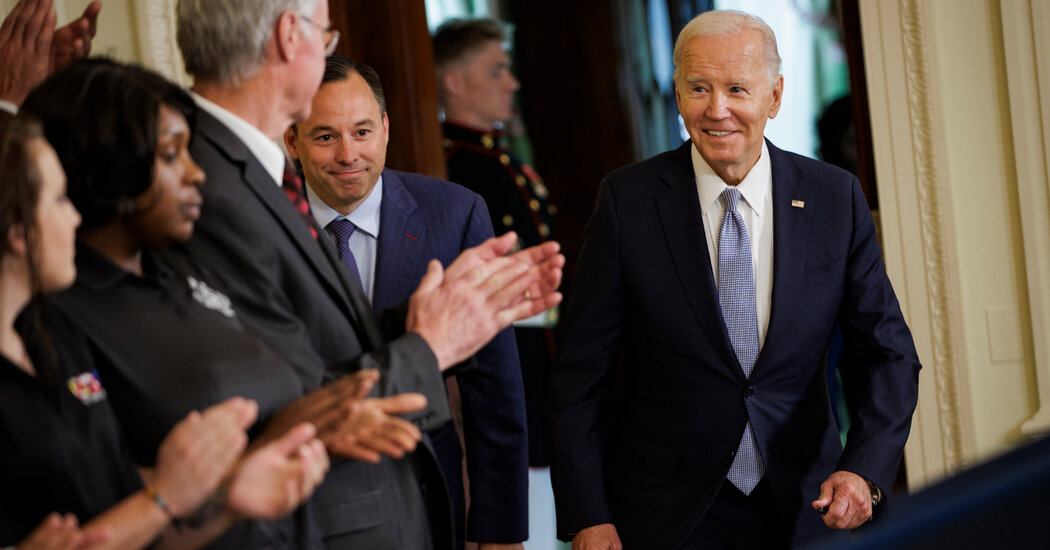President Biden staged a day of celebration on Wednesday to herald the reduction in inflation and the Inflation Reduction Act even though experts beli
President Biden staged a day of celebration on Wednesday to herald the reduction in inflation and the Inflation Reduction Act even though experts believe one had little to do with the other.
Mr. Biden hosted a boisterous ceremony in the East Room of the White House while allies and aides conducted briefings, gave speeches, published newspaper articles, sent emails, went on television and distributed talking points to mark the first anniversary of the Inflation Reduction Act, the major climate and energy law that is one of the signature accomplishments of his presidency.
The fact that the anniversary came at the same time as a significant decrease in the inflation rate was more happy coincidence than anything else, say economists, who attribute it more to the Federal Reserve’s interest rate increases and other factors. The legislation did plenty of important things in terms of investing in clean energy, raising corporate taxes and curbing prescription drug prices. But it was not really about inflation. As even Mr. Biden implicitly conceded last week, the name of the bill was more about political branding than policy goals.
Nonetheless, the president and his staff decided a little festivity was in order. The legislation, after all, advanced plenty of cherished Democratic priorities and will be one of Mr. Biden’s major arguments for a second term in next year’s election.
“This law is one of the biggest drivers of job and economic growth this country has ever seen,” Mr. Biden told a packed East Room, where he was joined by Senator Chuck Schumer of New York, the Democratic majority leader, and Representative Nancy Pelosi of California, the former speaker, who together pushed the bill through last year.
The Treasury Department reported that companies have announced nearly 200 new clean energy projects totaling more than $110 billion in investment over the past year, citing the tax credits in the law. “We’re leaving nobody behind,” Mr. Biden said. “We’re investing in all of America, in the heartland and coast to coast.”
Republicans responded to the Biden blitz with renewed criticism, arguing that the legislation did not live up to its promises to bring down the deficit, protect the middle class from tax increases and encourage products to be made in America. They pointed to a Wall Street Journal analysis that found companies based overseas, including China, are involved in projects accounting for 60 percent of the spending on clean energy.
“The so-called ‘Inflation Reduction Act’ is a communist manifesto filled with tax hikes and green subsidies that benefit China and make America more dependent on Beijing,” Nikki Haley, the former ambassador running for the Republican presidential nomination, wrote on X, the platform formerly known as Twitter. “While Joe Biden cozies up to Xi Jinping, American families are footing the bill for all this spending,” she added, referring to China’s president.
But as Mr. Biden pointed out, that has not stopped some Republicans from celebrating the benefits for their constituents from this and other economic legislation he has pushed through — “taking credit for the billions of dollars in private investments and thousands of jobs coming to their states,” as he put it.
What became known as the Inflation Reduction Act was originally a catchall vehicle for an ambitious menu of Democratic policy wishes that Mr. Schumer ultimately had to whittle down to satisfy objections from Senator Joe Manchin III, Democrat of West Virginia and a key vote for passage.
The final version, though, still included some of the most far-reaching Democratic legislative programs in generations, including the largest investment in clean energy to combat climate change in American history as well as higher taxes on corporations and wealthy Americans and measures to help seniors pay for medicine, including a $35-a-month cap on insulin. On Wednesday, Mr. Schumer called it “one of the great legislative feats” of the century.
At the time the bill was being considered by Congress, inflation was running around 9 percent so Democrats decided to name it the Inflation Reduction Act to address concerns with rising costs. But analysts then and now said it would have little impact on inflation in the short term. It has not hurt that inflation has since fallen to 3.2 percent, but even the president now says the name has stirred confusion about what the law does.
“The Inflation Reduction Act — I wish I hadn’t called it that, because it has less to do with reducing inflation than it does to do with dealing with providing for alternatives that generate economic growth,” Mr. Biden said last week at a fund-raiser in Utah.
Even so, White House officials said the law has reduced expenses for certain Americans in targeted ways, particularly those benefiting from its health care provisions and subsidies to buy electric vehicles.
Neera Tanden, the president’s domestic policy adviser, noted that the administration would soon negotiate with industry to lower the cost of 10 prescription drugs. “My focus is ensuring people understand they will have lower drug costs because of the Inflation Reduction Act, that those drug costs will be a real difference in their bottom line,” Ms. Tanden said.
Mr. Biden’s challenge has been selling the legislation to the public. A survey by The Washington Post and the University of Maryland found that 71 percent of Americans know little or nothing about the legislation and just 39 percent support it.
John D. Podesta, the president’s senior adviser for climate issues, said the accumulated effects of the law along with other legislation investing in public works and the semiconductor industry will be tangible soon enough.
“Once those investments happen, once those jobs are created, once those people are at work in red districts, purple districts, blue districts, it will be very hard to walk away from that,” he said.
www.nytimes.com

COMMENTS